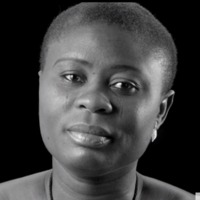
My trafficker was my husband. There was no way I could reach out to anybody for help.
My trafficker, he promised marriage, and we had actually taken the step by doing a traditional marriage. After I became pregnant, his attitude just changed. When we’d go to church on a Sunday, I would tell women I see that I could braid hair, and they would come to the house to have their hair braided, so he found out that I was good at it. Then, he decided to exploit me by taking the money. I was there without enough food. I couldn’t go out at will. I was confined in the house just braiding hair, and sometimes for up to 14 hours. A public health nurse always come to the house to visit, and I got connected with that through the WIC program. I didn’t have the courage to say anything to her. But when it was time for me to make the jump, I had to call her, and she said, "The first step is to go to the shelter." And I stayed there for 8 months with my son.
I was referred to a support group for immigrant women and refugees. That support group really helped me because I saw many other women in my shoes sharing their story. And some of them have gotten help, and that was really uplifting and encouraging for me.
It’s important to completely give survivors their power back by helping them. If they want to go to school, to go to school. If they want to start a trade or do their own business, to be able to start something on their own.
As a journalist, I am just one the few people who not only can write but can actually put their experiences together in a book, because writing the book was both therapeutic and challenging. I’m glad to have a second chance, and that is why I have dedicated my life to these efforts to help other victims. If you have not walked in their shoes, you have no idea what they are going through.
Courtesy of the Office for Victims of Crime









